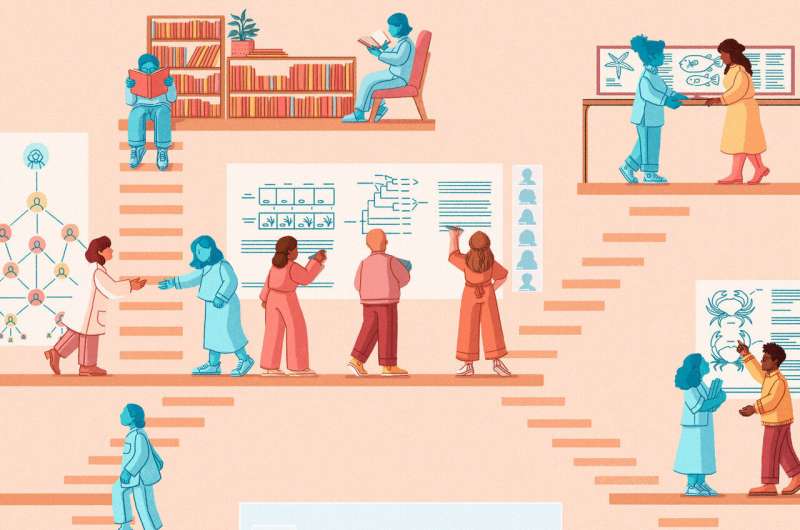This article has been reviewed according to Science X's editorial process and policies. Editors have highlighted the following attributes while ensuring the content's credibility:
fact-checked
peer-reviewed publication
proofread
Virtual lab meetings found to improve undergraduate research experience and foster diversity in academia

Moisés A. Bernal, assistant professor in the Department of Biological Sciences at Auburn University, is collaborating with researchers Kathleen Lotterhos (Northeast University), Megan Phifer-Rixey (Drexel University), and Torrance Hanley, (Sacred Heart University) to evaluate the effectiveness of virtual lab meetings in demystifying the hidden curriculum in academia, incentivize primary research among students without previous experience, and foster participation of underrepresented groups in STEM.
The "Biological Practices" article, titled "A virtual lab meeting training program mutually benefits mentees and host labs" and published in Proceedings of the Royal Society B: Biological Sciences, dives into the specific details that are needed to develop a virtual meetings program from scratch, and reports on the experiences by both mentors and mentees.
The first step on the Virtual Lab Meeting Program (LaMP) was to match research mentors (i.e. faculty in research intensive institutions) with students in STEM fields (i.e. at institutions with limited research support), Bernal indicated
"The program matched mentors and mentees based on affinity of research topics, and mentees were provided with a $500 stipend if they participated in at least 10 meetings," Bernal said. "This is important because the students had an incentive to participate at the meetings and actively exchange ideas with a research lab."
The team collected data that shared insight of the value of the LaMP experience.
"When we analyzed the data, we saw a gap that exists between the current mentors and the mentees," he said. "The mentees were a much more diverse group then the mentors."
The data included racial and sexual diversity among mentees participating. However, the faculty did not exhibit as much diversity, which highlights the need for this type of program among undergraduate and graduate students.
"Our results clearly show that this program worked to extend the professional networks of traditionally under-represented groups in the sciences, with little extra time commitment on the part of the participating labs," said Lotterhos. "We hope these results will stimulate similar efforts across STEM disciplines."
And those efforts can be easily integrated into a lab.
"For faculty, this is a small-time investment, because we are already conducting regular lab meetings and we can simply bring on a new mentee into this experience," Bernal added. The results from the study show that the mentees learned new information on specific techniques and study systems, while developing a broader network of personal connections in academia.
Further, the mentees learned how to discuss and present research as well as how to discuss a manuscript and the overall writing process. Meanwhile, mentors indicated it was beneficial to gain novel perspectives on how to discuss peer-reviewed manuscripts, and gain knowledge on other study systems presented by the mentees.
Overall, the survey results indicate that the program was useful for staff and students in the mentor's lab as well as the mentees, and participants strongly recommend this program to future participants.
Bernal spoke about his time with a virtual student in his lab.
"It was a positive experience because I was able to have someone in my lab with a novel perspective on how to discuss manuscripts and to look at research problems from a new angle," he explained. "This program helps to develop and expand professional networks for participants. It also helps them prepare to apply to graduate school and learn how to build their CVs over time."
Overall, the LaMP initiative represents an effective way of connecting researchers with students in STEM, while fostering the participation of underrepresented groups in academia.
More information: Katie E. Lotterhos et al, Lighting pathways to success in STEM: a virtual Laboratory Meeting Programme (LaMP) mutually benefits mentees and host laboratories, Proceedings of the Royal Society B: Biological Sciences (2024). DOI: 10.1098/rspb.2024.0149
Journal information: Proceedings of the Royal Society B
Provided by Auburn University College of Sciences and Mathematics




















